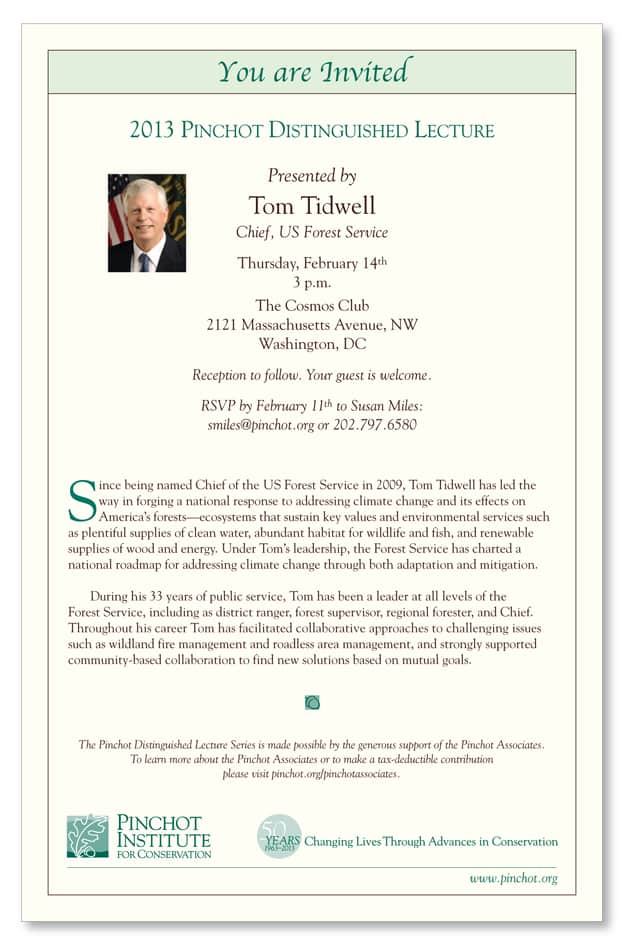 Thanks to the Pinchot Institute for sending this…Char is going to feature it in his column this week and that will be reposted here when available.
Thanks to the Pinchot Institute for sending this…Char is going to feature it in his column this week and that will be reposted here when available.
Earlier this month Tom Tidwell delivered the 2013 Pinchot Distinguished Lecture in Washington, DC. His speech was titled, “Sustaining Forests in the Time of Climate Change,” and was followed by an extended Q&A moderated by Char Miller and Al Sample. Some video highlights, including the Chief calling for reauthorization of stewardship contracting and speaking on the importance of urban forests, green infrastructure, and international programs are available on our website: http://www.pinchot.org/events/432.
The Pinchot Institute also forwarded this transcript of the talk.
Thanks again to the Pinchot Institute and Happy 50th Birthday!
I just watched the first clip, and I think it sets a foundation for the management of the future. So that’s why I think it’s important to discuss.
I agree that the past is not the future and that should change the way we think about everything. That’s what our Wise Forest Supervisor The Professor said that we should have a campfire, sit around, and discuss what it really means to all that we know if we can’t go by what we learned in the past; not the practitioners and not the scientists.
The Chief says we need to “restore” function and processes. But we wouldn’t need to restore them if they were fine now. But if they’re not resilient now, then we are assuming that they were appropriately resilient in the past. But then this climate change is “unprecedented” so it is just a random coincidence that they were resilient before? My point is that I think the word “restore” in unnecessarily confusing.
Why can’t we say:
We don’t know what’s going to happen
We will never have the bucks to manage everything
We will need to pick and choose which processes and functions and species are most important to us
We will have to weigh that against the costs and the likelihood of success of interventions
The most important thing is to protect the basics.. air, water, and soil and we may have to deal with vegetation and wildlife and fish that are not our preferred species.
But it is our task, as Forest Service employees to be absolutely clear and transparent to the public about what we plan to do, or not do, and what we believe the impacts will be to them and to the environment.
It’s not “restoration” at all, except that we are going to try to bring the good things from the past into the future. It’s joining together to figure out what’s important to us, as the climate changes, and see if we can work together to keep those things.
Comments on this, or any other part of the video or transcript, are appreciated. I’d like to hear from some of you seldom-heard-from folks if you feel so inclined…
I agree with your points, Sharon, with this exception:
I believe we can not afford to “pick and choose” that way. Instead, we must be more holistic in our assessment and in our practice. Narrow anthropocentric focus has got us into the ecological messes we now find ourselves in. It is time we follow Aldo Leopold’s advice and begin to become more a part of Nature than apart from Nature.
Dave- I think that we may agree, but our ways of talking about it are very different.
As I’ve said before, Aldo Leopold didn’t discover anything our tribal mothers and fathers and mystics throughout the centuries didn’t already know.
And, others have studied and found that sometimes it’s not the philosophy of earthcare so much as the need to make a living, or ignorance, or some combination thereof, that causes “ecological messes.”
SO
I would agree with a “more holistic assessment and practice” in general, as long as the specifics of why we are doing, or not doing assessments, or practices were absolutely open and clearly articulated to everyone.